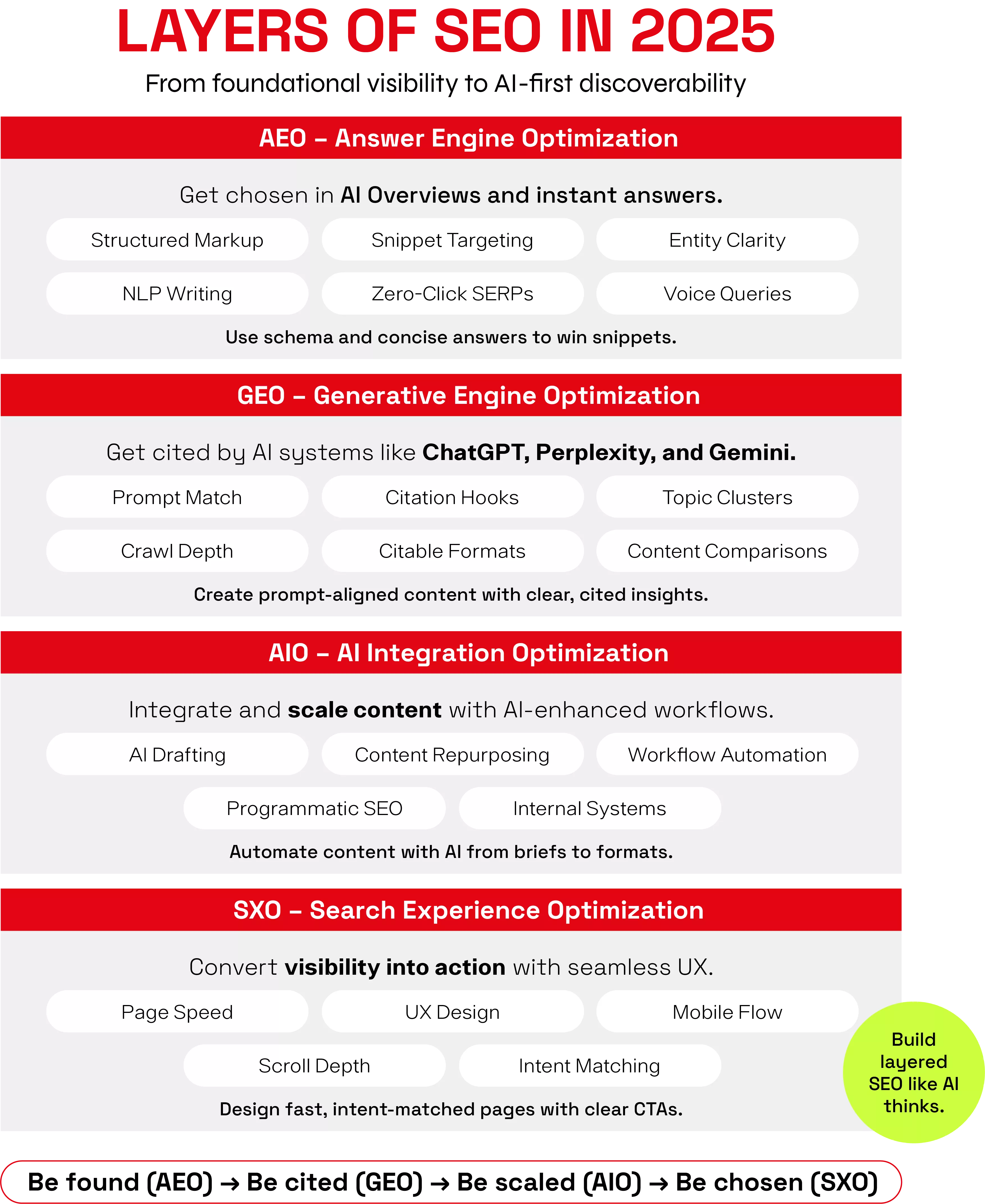Search behavior is changing rapidly. Users increasingly expect direct, relevant answers rather than clicking on search results. Thanks to AI-driven search engines such as ChatGPT, Gemini and Google SGE, new ways are emerging to be visible even without clicking. Generative Engine Optimization (GEO) plays into this: it's a way of content optimization where you make sure AI platforms include your brand in their generated responses. In this blog, you will read what exactly GEO is, how it works, what role branded SEO plays in this and what recent developments such as AI Overviews mean for you.

What is GEO?
And why is it important to your online strategy?
What is GEO (Generative Engine Optimization)?
Generative Engine Optimization (GEO) is the process of shaping your content so that AI search technology incorporates your information into automatically generated answers. Instead of competing for a high spot in traditional search results, GEO focuses on presence in the final answer the user sees. You want AI to recognize your content as trustworthy, relevant and useful. This requires more than just good keywords. GEO requires structure in your texts, clear language and depth of content. Topicality, source citation and the structure of your page also play an important role. The better this is done, the more likely your brand will be selected as a response source.
How does GEO work?
To properly understand GEO, it is important to know how generative search engines process information. AI platforms such as ChatGPT or Gemini do not display a list of links like classic search engines do. They provide instant composite answers to the user's query. These answers are based on huge amounts of online content and are built from information sources that the AI considers reliable, clear and relevant.
The system pays attention to several aspects. The structure of your text should be clear, with logical headings and well-organized paragraphs. The content must match the user's query. Reliability is also crucial: content with a clear author, publication date and external sources is more likely to be used as a starting point. Finally, writing style plays a role. AI is more likely to choose texts that are written in an accessible and human way than dry, technical pieces.
What is the difference between SEO and GEO?
SEO and GEO complement each other, but differ in some crucial ways. Whereas SEO is all about being recognized within classic search engines like Google, GEO focuses on visibility within AI answers. That requires different choices in your content strategy: less focus on just keywords and links, more on structure, context and reliability. The underlying technique and purpose differ. Below you can see how those two strategies compare.
Purpose
- SEO: To rank in search results
- GEO: Being mentioned in AI answers
Interface
- Keywords, backlinks, technique
- Structure, semantics, reliability
Focus
- Clicks, positions, CTR
- AI visibility, mention tracking
Measurement
- Klikken, posities, CTR
- AI-zichtbaarheid, mention tracking
Example question
- SEO: “Best e-bike 2025”
- GEO: “What is the best e-bike for commuting?”
What does the rise of generative AI mean for traditional SEO?
Generative AI is changing the way people gather information. Instead of clicking through search results themselves, users expect direct, composite answers from systems such as ChatGPT and Gemini. In this new reality, the role of SEO is shifting: it is no longer just about rankings in search results, but about being visible within the answers generated by AI.
For companies, this means a fundamental change in strategy. Content must not only be optimized for search engines, but also clear, reliable and content strong enough to be chosen as a source by AI models. Instead of focusing only on keywords and metadata, this development requires building content authority. This is the only way to stay relevant in a landscape where AI is increasingly the first, and sometimes only, point of contact.
Why is GEO relevant to your online strategy?
GEO is not a luxury, but a necessity for brands that want to stay visible online at a time when AI is taking over the orientation process. Instead of clicking on search results, users are presented with their answers instantly. If your brand is not among them, you are missing visibility at the moment it matters. By writing branded, you ensure that your name is included in the response and you are actually recognized as the sender. At the same time, you strengthen your authority because AI models prefer trusted sources with current, well-structured content. And with AI tools like Perplexity, ChatGPT and Google SGE becoming more widely used, new gateways to your brand are emerging beyond your website. Brands that understand and apply this now have a competitive advantage in a playing field that is still evolving.
In doing so, it is important not to view GEO as a stand-alone strategy, but as part of a broader AI-first SEO approach. In 2025, SEO will be layered: from being visible in AI Overviews (AEO), to being cited in AI Answers (GEO), to producing scalable content (AIO), to optimizing the user experience (SXO). The visual below (Redkiwi-style) shows how these layers complement and reinforce each other in the modern search engine world.

What are the potential drawbacks to the rise of GEO?
The rise of generative search engines is fundamentally changing search behavior. Users are increasingly asking complete questions rather than single keywords, and expecting a direct answer rather than a list of links. This shifts the orientation process from Web sites to AI platforms, which function as a new gateway to information. This makes it more important than ever to create content that matches your target audience's information needs and language so that AI recognizes your brand as a trusted source and includes it in its response. Branded SEO is a powerful tool in this, as you actively weave your brand into content responses.
What is the impact of GEO on search behavior - and how do you measure it?
The rise of AI platforms such as ChatGPT, Gemini and Perplexity is fundamentally changing search behavior. Users increasingly formulate complete questions in natural language and expect immediate, summarized answers, without having to click through a list of search results. This is shifting the orientation process from Web sites to AI answers, making traditional SEO metrics such as click behavior and rankings less meaningful.
At Redkiwi, we actively measure this shift. Using tools like BrightEdge, we map which keywords appear in AI Overviews, People Also Ask, Featured Snippets and other SERP features. We see not only where you are visible, but also where you have the potential to be included. For example, for one client, we found 43 keywords already listed in AI answers, versus over 1,400 search terms with potential.
By combining those insights with data on content structure and semantic coverage, we can make targeted adjustments. In this way, we make GEO not only measurable, but also actionable for brands that take AI visibility seriously.
What can you do today to optimize GEO?
GEO may sound complex, but you can get started today. Here are practical first steps to AI-proof your content:
- Structure your content clearly: use clear H1, H2 and FAQ sections
- Write conversational: use natural language, avoid jargon
- Add structured data: such as FAQ Page or HowTo schema markup
- Build E-E-A-T: show who the author is, cite sources, show experience
- Use visuals with captions: AI also reads alt text and captions
- Update your content regularly: AI tools prefer up-to-date information
- Measure your visibility: via Perplexity, Poe or branded search in ChatGPT
Since the introduction of AI Overviews in Google, it becomes even more important to structure content and make it contextually rich. These AI summaries answer questions at a glance, with only a few sources visible. By building content in GEO fashion, you increase the likelihood that your page will be selected for such a summary.
Start your GEO strategy today at Redkiwi!
The future of search behavior is generative. That doesn't mean SEO is disappearing, but it does mean GEO is becoming an essential part of a modern content strategy. Want to make sure your brand is visible in the answers of AI? At Redkiwi, we help companies with a practical and forward-thinking GEO approach, from content structure and semantic optimization to implementing AI-friendly data.
Curious about GEO?
Contact us today and find out what GEO can do for your organization!




